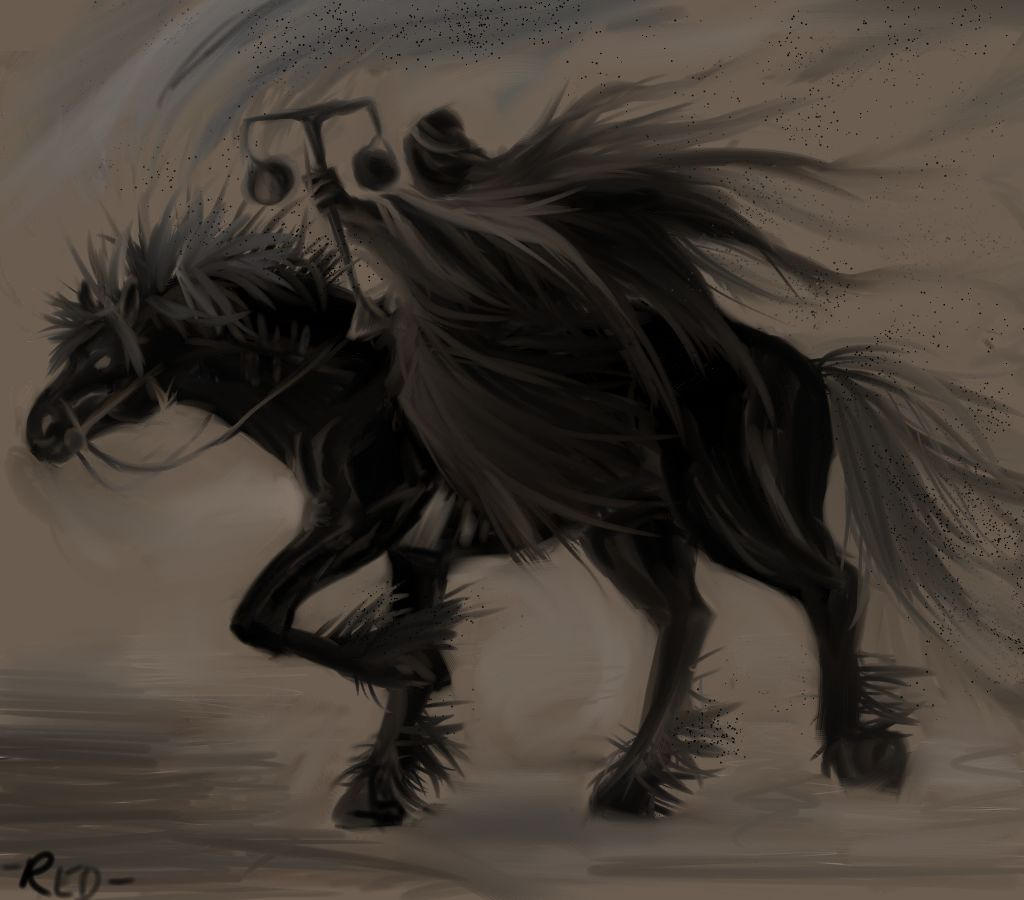Dark Horse Rider
Moving
at the speed of sight
cannot capture
the beasts of night
ravenous
for the righteous
pawns of light.
who among you
is ready for a fight?

Black horse of the apocalypse -- creative-drive
"I watched as the Lamb opened the first of the seven seals. Then I heard one of the four living creatures say in a voice like thunder, "Come!" I looked, and there before me was a white horse! Its rider held a bow, and he was given a crown, and he rode out as a conqueror bent on conquest. When the Lamb opened the second seal, I heard the second living creature say, "Come!" Then another horse came out, a fiery red one. Its rider was given power to take peace from the earth and to make people kill each other. To him was given a large sword. When the Lamb opened the third seal, I heard the third living creature say, "Come!" I looked, and there before me was a black horse! Its rider was holding a pair of scales in his hand. Then I heard what sounded like a voice among the four living creatures, saying, "Two pounds of wheat [a choenix, about 1 kg] for a day’s wages [a denarius], and six pounds of barley [6 choenixes, about 3 kg]for a day’s wages, and do not damage the oil and the wine!" When the Lamb opened the fourth seal, I heard the voice of the fourth living creature say, "Come!" I looked, and there before me was a pale horse! Its rider was named Death, and Hades was following close behind him. They were given power over a fourth of the earth to kill by sword, famine and plague, and by the wild beasts of the earth. When he opened the fifth seal, I saw under the altar the souls of those who had been slain because of the word of God and the testimony they had maintained. They called out in a loud voice, "How long, Sovereign Lord, holy and true, until you judge the inhabitants of the earth and avenge our blood?" Then each of them was given a white robe, and they were told to wait a little longer, until the full number of their fellow servants, their brothers and sisters [adelphoi, referring here to believers], were killed just as they had been. I watched as he opened the sixth seal. There was a great earthquake. The sun turned black like sackcloth made of goat hair, the whole moon turned blood red, and the stars in the sky fell to earth, as figs drop from a fig tree when shaken by a strong wind. The heavens receded like a scroll being rolled up, and every mountain and island was removed from its place. Then the kings of the earth, the princes, the generals, the rich, the mighty, and everyone else, both slave and free, hid in caves and among the rocks of the mountains. They called to the mountains and the rocks, "Fall on us and hide us from the face of him who sits on the throne and from the wrath of the Lamb! For the great day of their wrath has come, and who can withstand it?" [New International Version]
ReplyDeleteDating from the late 1st century, the Book of Revelation, the last part of the New Testament, derives its title from the first word of the text, apokalypsis, meaning "unveiling" or "revelation" in Koiné Greek (the Alexandrian dialect, based mainly on Attic and related Ionic speech forms, that developed after Alexander the Great's conquests in the 4th century BCE, becoming the lingua franca for centuries). In the 2nd century various scholars identified its author as John the Apostle, but a century later Dionysius of Alexandria noted that the gospel and epistles were written in correct and elegant Greek but that Revelation was not. The entire book is a letter that John, on the island of Patmos in the Aegean, addressed to churches in the Roman province of "Asia," in which he described a series of prophetic visions, which of course can be variously interpreted. Chapter 6 tells of a book with seven seals. Opening the first four summoned figures riding white, red, black, and pale horses, usually interpreted as conquest (or pestilence), war, famine, and death. The man on the black horse carried a pair of scales, indicating the way that bread would have been weighed (also a common symbol of justice since they were used to weigh out the grains for a set price); the cost was about 10 times higher than normal, since a day's wages only bought enough food for one person, while the olive oil and wine supplies for the affluent would remain unaffected; bread is a necessity, but people can live without oils and wine. Grain is also more susceptible to famine than olive trees and grapevines, which root more deeply. The preservation of oil and wine could also symbolize the preservation of the Christian faithful, who used oil and wine in their sacraments. However, the statement suggests selective scarcity resulting from class injustice and privilege. Charles Cutler Torrey, who taught Semitic languages at Yale, insisted that the authors of the prophetic books of the Bible should be regarded primarily as poets, though most translations are in prose. He demonstrated that the three major songs in "Revelation" all fall naturally into four regular metrical lines plus a coda, and that other dramatic incidents, such as in chapter 6 where the terrified people cry out to be hidden, are also constructed in an essentially poetic manner. He further argued that the book had been originally written in Aramaic and then badly translated into Greek, and that John did not directly cite any of the older prophets because they would have composed poetry in Hebrew, which had different metrical structures and rules than his Aramaic.
ReplyDelete